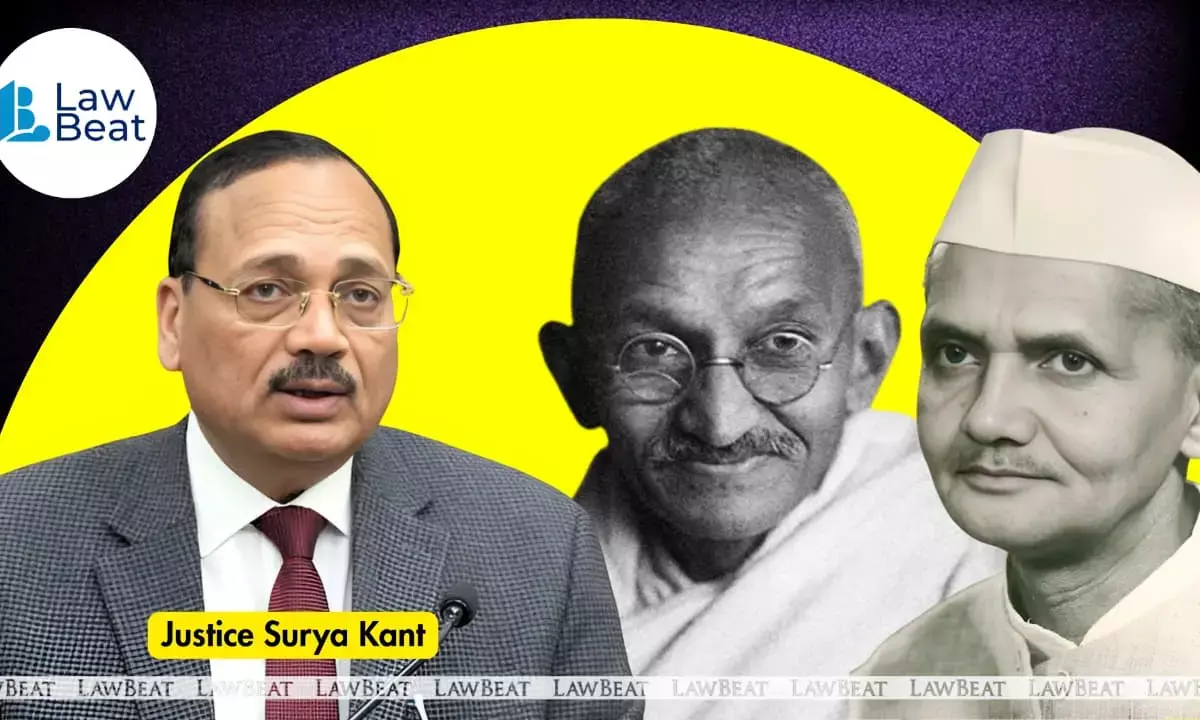From ‘Jai Jawan, Jai Kisan’ to Truth & Non-Violence: Justice Surya Kant Reflects on Gandhi, Shastri’s Shared Vision

Justice Kant marked Gandhi Jayanti recalling Mahatma Gandhi & Lal Bahadur Shastri’s legacy of justice, humility, and service as guiding ideals for India’s democracy
The Supreme Court on Thursday, i.e. October 2, witnessed solemn tributes to Mahatma Gandhi and Lal Bahadur Shastri, marking their birth anniversaries with reflections on justice, simplicity, and selfless service.
Visiting Mahatma Gandhi’s statue within the Court premises, Justice Surya Kant described the atmosphere as one of “calm dignity,” evoking the Father of the Nation’s message of truth and non-violence. Gandhi’s unique ability to unite millions across caste, class, and region was recalled as a transformative force that galvanized India’s independence movement and challenged colonial power through moral conviction rather than coercion.
Justice Kant highlighted Gandhi’s deep concern for villages, self-reliance, and the dignity of the rural masses; principles that anchored his political vision in the lives of ordinary Indians. His strength, he observed, lay not in the trappings of power but in the courage of simplicity and the moral authority of conviction.
Importantly, Gandhi’s understanding of freedom was seen as extending beyond political sovereignty. For him, justice was measured not merely in constitutional structures but in the dignity accorded to the weakest, the marginalized, and the voiceless. His call was for a society where compassion, equity, and harmony served as the guiding principles of public life.
Drawing on his background in law, Gandhi’s philosophy of conflict resolution was underscored as fundamentally different from adversarial courtroom battles. He believed that disputes, no matter how fierce, contained threads of common interest, and that reconciliation could be achieved through appeals to both reason and the human spirit. In this sense, Gandhi redefined conflict not as a source of division but as an opportunity for harmony.
Tributes were also paid to Lal Bahadur Shastri, India’s second Prime Minister, who shared his birth anniversary with Gandhi. Steeped in Gandhian thought since his youth, Shastri carried those ideals into governance with humility, integrity, and an unyielding spirit of service.
His iconic call; “Jai Jawan, Jai Kisan”, was remembered as a resonant affirmation of patriotism, honoring both the soldier at the borders and the farmer in the fields. Justice Kant noted that Shastri’s leadership translated Gandhian principles into decisive action, embodying simplicity and accessibility while steering India through critical years with moral clarity.
Both Gandhi and Shastri, Justice Kant observed, shared a profound devotion to justice as the moral compass of society. For Gandhi, justice was inseparable from truth and compassion. For Shastri, it was expressed through good governance, inclusivity, and policies that touched every household and every farm.
This convergence of philosophy and practice, of moral ideals and administrative execution, was described as the “bedrock of India’s democratic journey.” The legacy of both leaders, it was stressed, is not confined to history books but remains a living call to action for citizens, lawmakers, and judges alike.
As the legal fraternity bowed in reverence, the tributes concluded with a collective reminder: Gandhi and Shastri’s ethos of justice, humility, and selfless service must remain the guiding forces of Indian democracy. Their message, speakers noted, continues to illuminate the path ahead, urging present and future generations to uphold truth, compassion, and inclusivity in public life.
“Thank you, Jai Hind!” echoed as Justice Kant concluded.
